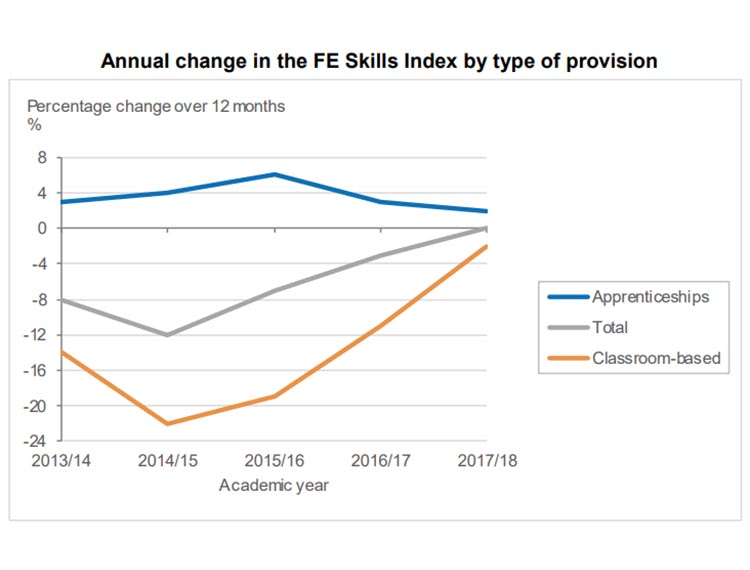The impact of further education training on productivity

The value-added for apprenticeships has increased year-on-year since 2012/13
The Further Education (FE) Skills Index shows how the aggregate value of the skills supplied by the FE system each year has changed over time.
DfE aims to deliver a skills system that delivers skills that the economy and employers value to a greater number of people. This report presents experimental analysis aiming to monitor and evaluate the value of FE and Skills in England.
The index works by taking an estimate of the ‘value-added’ for all adult learners and apprentices in England who have successfully completed their training.
The Skills Index is a key part of how we measure the productivity impact of the FE system.
In line with established academic and public policy practice, we use the increase in earnings due to achieving a qualification as a measure of the impact on productivity.
The Skills Index tracks the total productivity contribution of the FE system by aggregating the earnings returns for the total number of learners achieving qualifications and subsequently going into sustained employment.
Changes to the Skills Index occur when there are changes in either the numbers of people achieving qualifications in a year and/or changes in the average value of the qualifications obtained.
The average value of qualifications can change because learners are switching to training that offer more valuable skills, or the same qualifications become more valuable over time as the quality of the training improves.
Timely data is available on the numbers of achievements, which allows changes in the numbers of students or the types of training studied to be quickly incorporated into the Skill Index.
Data to estimate the quality of courses has a much greater lag and it will take a number of years before such changes are included in the index.
This means that until this data is available the Skills Index underestimates the overall value of the skills value-added when there are policies, such as the recent apprenticeship reforms, that seek to boost quality.
The overall Skills Index, covering both apprenticeships and classroom-based learning, has decreased each year since 2012/13, before flattening out in 2017/18.
The value-added for classroom-based training has decreased during this period, due to a large decrease in the number of achievements at Full Level 2 and Full Level 3. In 2017/18 the value-added for classroom-based training decreased by 2 per cent on the previous year.
However, the picture for apprenticeships is markedly different to that of adult classroombased qualifications. The value-added for apprenticeships has increased year-on-year since 2012/13.
In 2017/18 it increased by 2 per cent on the previous year due to an increase in the volume of achievements of advanced and higher apprenticeships, as well as a small shift towards sectors with higher wage returns.
For apprenticeships, the Skills Index does not estimate the added-value of the switch from frameworks to standards. As full outcome data for apprentices achieving apprenticeship standards is not yet available, the 2 per cent increase is likely to be a 4 conservative estimate. In 2017/18 achievements on standards made up 1 per cent of all apprenticeship achievements.
Further education skills index
PDF, 649KB, 15 pages
Details
The further education skills index shows how the aggregate value of the skills supplied by the further education system each year has changed over time.
The index works by taking an estimate of the ‘value added’ for all adult learners and apprentices in England who have successfully completed their training.
The skills index covers apprenticeships and adult training from the 2012 to 2013 academic year, up until 2017 to 2018.











Responses